Responsible Business in Society: Misery in the Maquiladoras
VerifiedAdded on 2023/06/04
|12
|4273
|362
Essay
AI Summary
This essay critically evaluates the article ‘Misery in the Maquiladoras,’ focusing on the poor working conditions in factories near the US-Mexico border under NAFTA. It presents three main arguments: the impact of free trade agreements on labor rights, the role of leadership in ensuring occupational safety, and the necessity of employment for workers despite hazardous conditions. The essay argues that while free trade agreements like NAFTA aim to boost economic growth, they often exploit workers due to loopholes that prioritize business interests over worker safety. It emphasizes the importance of employer responsibility in maintaining machinery, providing safety equipment, and fostering a positive workplace culture. Furthermore, the essay addresses how unemployment in emerging economies forces individuals to accept unsafe working conditions, highlighting the need for government intervention and stronger trade policies to protect workers' rights and improve their living standards. The analysis draws upon academic journals and books to support its claims, ultimately advocating for a more ethical and responsible approach to business in the context of global trade.
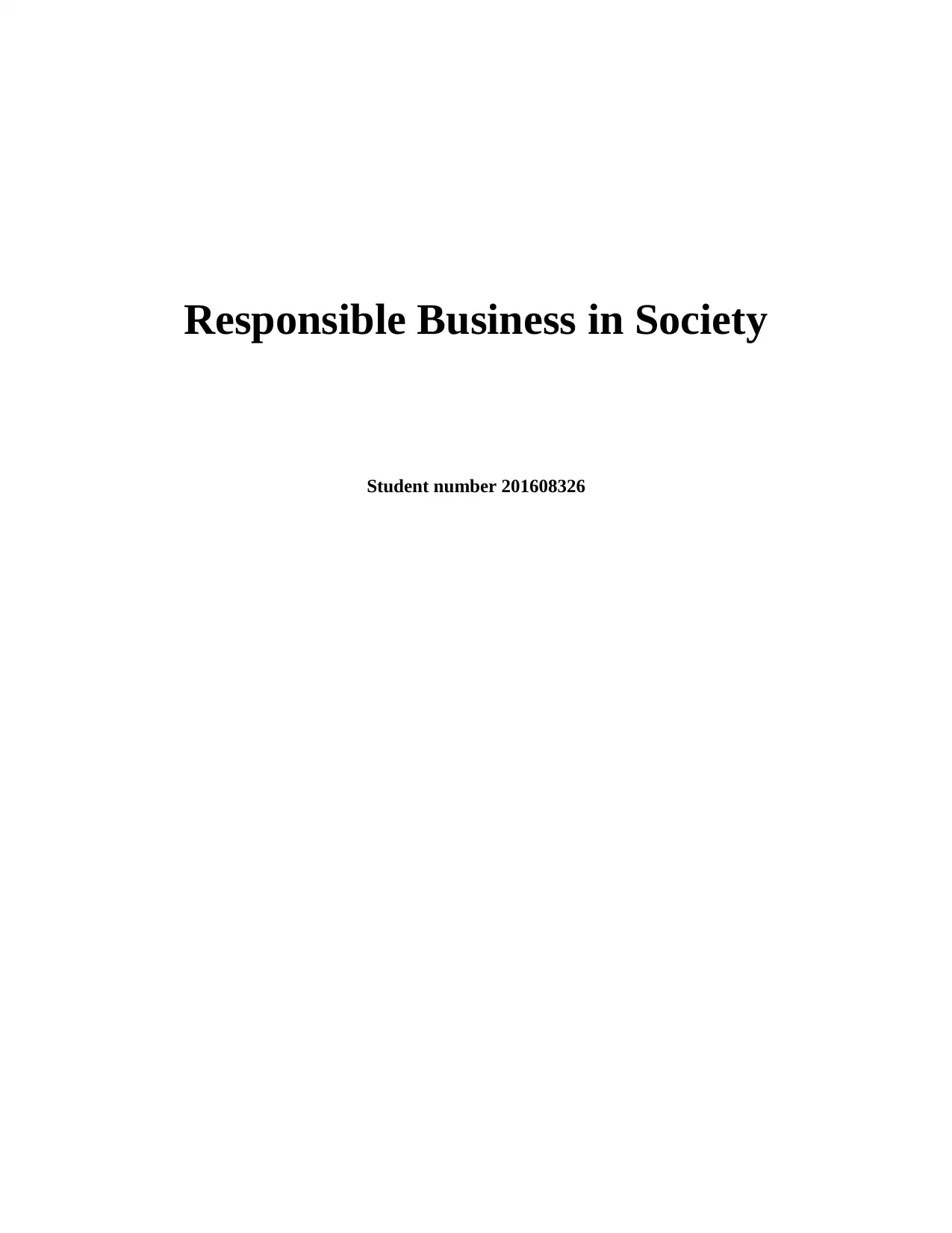
Responsible Business in Society
Student number 201608326
Student number 201608326
Paraphrase This Document
Need a fresh take? Get an instant paraphrase of this document with our AI Paraphraser
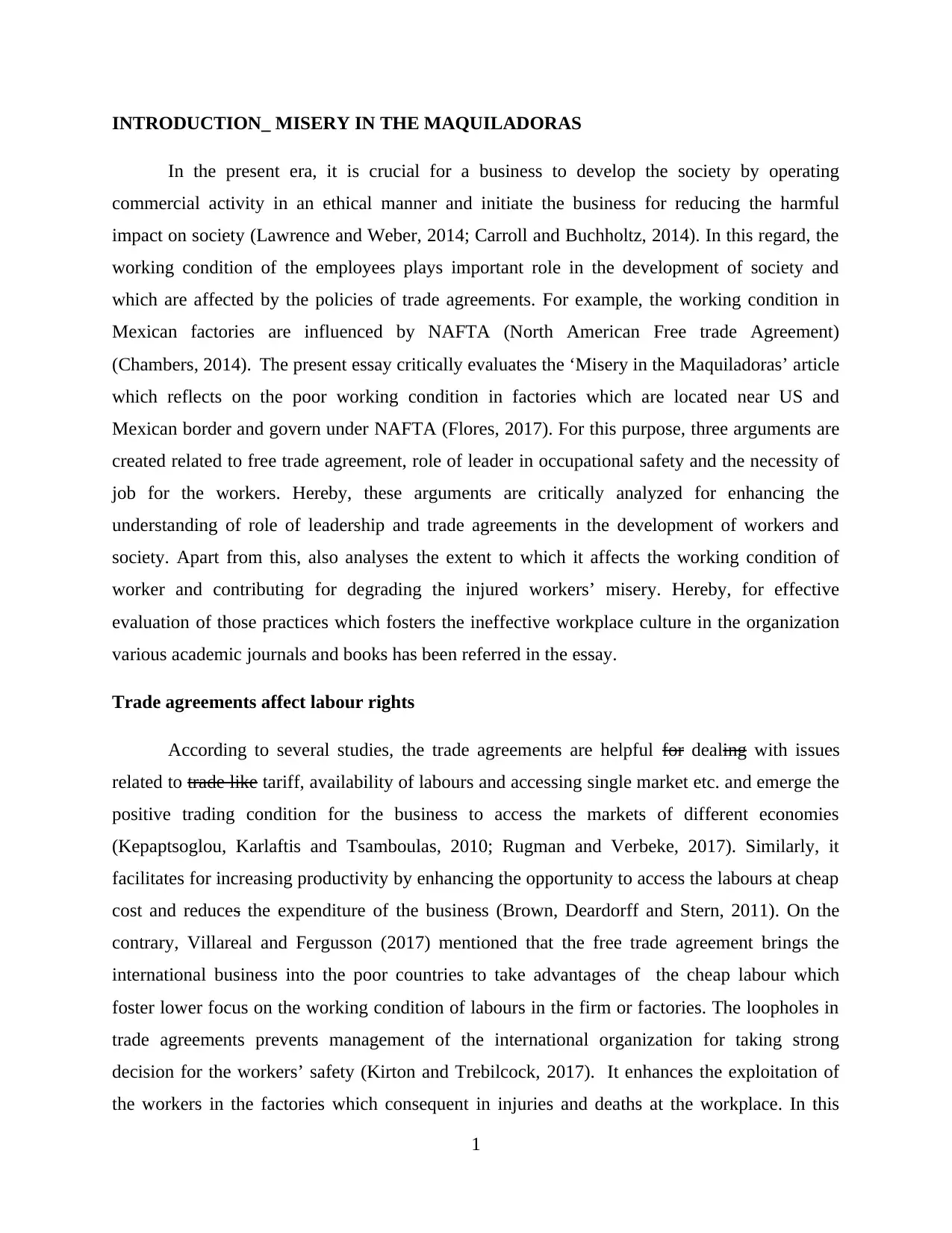
INTRODUCTION_ MISERY IN THE MAQUILADORAS
In the present era, it is crucial for a business to develop the society by operating
commercial activity in an ethical manner and initiate the business for reducing the harmful
impact on society (Lawrence and Weber, 2014; Carroll and Buchholtz, 2014). In this regard, the
working condition of the employees plays important role in the development of society and
which are affected by the policies of trade agreements. For example, the working condition in
Mexican factories are influenced by NAFTA (North American Free trade Agreement)
(Chambers, 2014). The present essay critically evaluates the ‘Misery in the Maquiladoras’ article
which reflects on the poor working condition in factories which are located near US and
Mexican border and govern under NAFTA (Flores, 2017). For this purpose, three arguments are
created related to free trade agreement, role of leader in occupational safety and the necessity of
job for the workers. Hereby, these arguments are critically analyzed for enhancing the
understanding of role of leadership and trade agreements in the development of workers and
society. Apart from this, also analyses the extent to which it affects the working condition of
worker and contributing for degrading the injured workers’ misery. Hereby, for effective
evaluation of those practices which fosters the ineffective workplace culture in the organization
various academic journals and books has been referred in the essay.
Trade agreements affect labour rights
According to several studies, the trade agreements are helpful for dealing with issues
related to trade like tariff, availability of labours and accessing single market etc. and emerge the
positive trading condition for the business to access the markets of different economies
(Kepaptsoglou, Karlaftis and Tsamboulas, 2010; Rugman and Verbeke, 2017). Similarly, it
facilitates for increasing productivity by enhancing the opportunity to access the labours at cheap
cost and reduces the expenditure of the business (Brown, Deardorff and Stern, 2011). On the
contrary, Villareal and Fergusson (2017) mentioned that the free trade agreement brings the
international business into the poor countries to take advantages of the cheap labour which
foster lower focus on the working condition of labours in the firm or factories. The loopholes in
trade agreements prevents management of the international organization for taking strong
decision for the workers’ safety (Kirton and Trebilcock, 2017). It enhances the exploitation of
the workers in the factories which consequent in injuries and deaths at the workplace. In this
1
In the present era, it is crucial for a business to develop the society by operating
commercial activity in an ethical manner and initiate the business for reducing the harmful
impact on society (Lawrence and Weber, 2014; Carroll and Buchholtz, 2014). In this regard, the
working condition of the employees plays important role in the development of society and
which are affected by the policies of trade agreements. For example, the working condition in
Mexican factories are influenced by NAFTA (North American Free trade Agreement)
(Chambers, 2014). The present essay critically evaluates the ‘Misery in the Maquiladoras’ article
which reflects on the poor working condition in factories which are located near US and
Mexican border and govern under NAFTA (Flores, 2017). For this purpose, three arguments are
created related to free trade agreement, role of leader in occupational safety and the necessity of
job for the workers. Hereby, these arguments are critically analyzed for enhancing the
understanding of role of leadership and trade agreements in the development of workers and
society. Apart from this, also analyses the extent to which it affects the working condition of
worker and contributing for degrading the injured workers’ misery. Hereby, for effective
evaluation of those practices which fosters the ineffective workplace culture in the organization
various academic journals and books has been referred in the essay.
Trade agreements affect labour rights
According to several studies, the trade agreements are helpful for dealing with issues
related to trade like tariff, availability of labours and accessing single market etc. and emerge the
positive trading condition for the business to access the markets of different economies
(Kepaptsoglou, Karlaftis and Tsamboulas, 2010; Rugman and Verbeke, 2017). Similarly, it
facilitates for increasing productivity by enhancing the opportunity to access the labours at cheap
cost and reduces the expenditure of the business (Brown, Deardorff and Stern, 2011). On the
contrary, Villareal and Fergusson (2017) mentioned that the free trade agreement brings the
international business into the poor countries to take advantages of the cheap labour which
foster lower focus on the working condition of labours in the firm or factories. The loopholes in
trade agreements prevents management of the international organization for taking strong
decision for the workers’ safety (Kirton and Trebilcock, 2017). It enhances the exploitation of
the workers in the factories which consequent in injuries and deaths at the workplace. In this
1
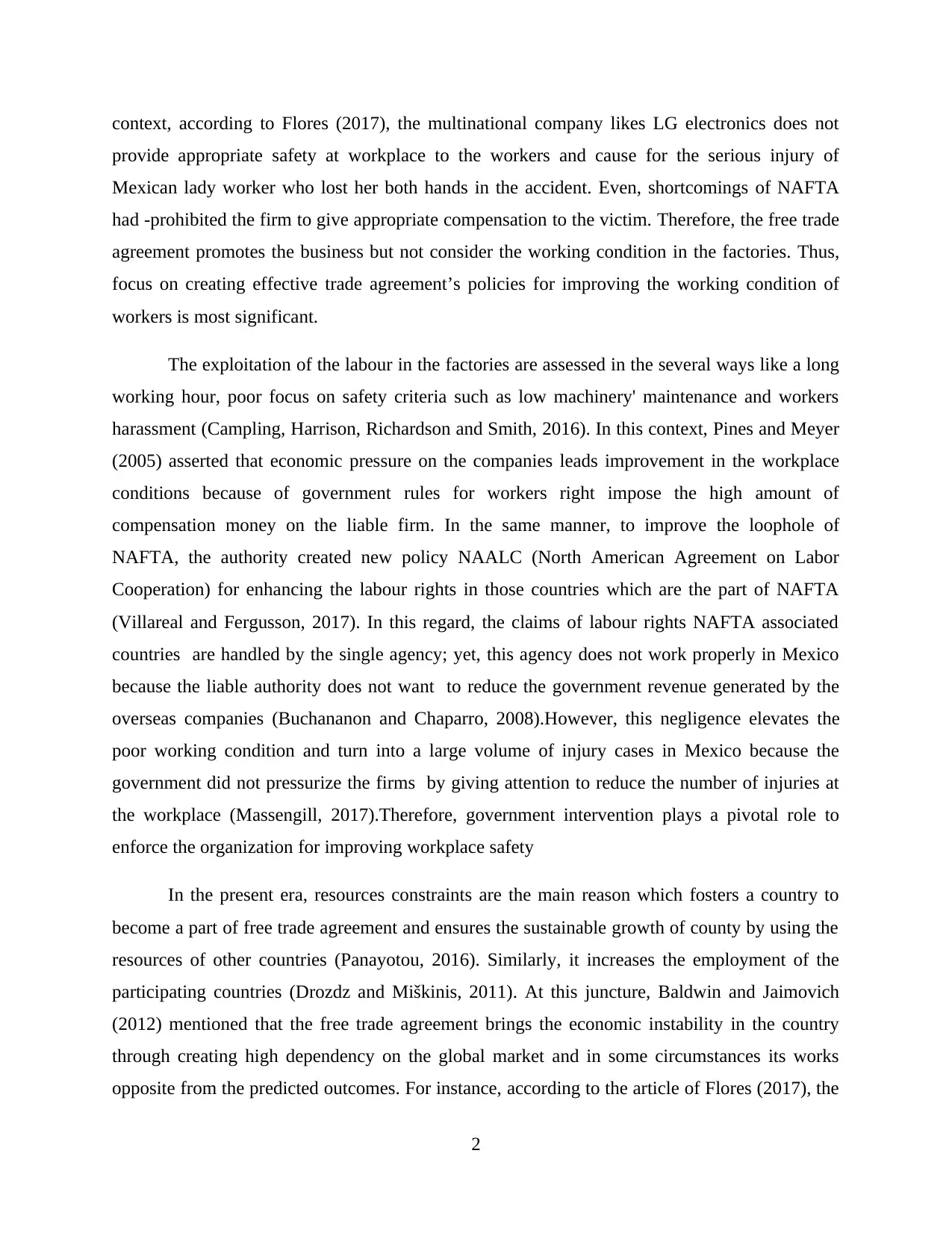
context, according to Flores (2017), the multinational company likes LG electronics does not
provide appropriate safety at workplace to the workers and cause for the serious injury of
Mexican lady worker who lost her both hands in the accident. Even, shortcomings of NAFTA
had -prohibited the firm to give appropriate compensation to the victim. Therefore, the free trade
agreement promotes the business but not consider the working condition in the factories. Thus,
focus on creating effective trade agreement’s policies for improving the working condition of
workers is most significant.
The exploitation of the labour in the factories are assessed in the several ways like a long
working hour, poor focus on safety criteria such as low machinery' maintenance and workers
harassment (Campling, Harrison, Richardson and Smith, 2016). In this context, Pines and Meyer
(2005) asserted that economic pressure on the companies leads improvement in the workplace
conditions because of government rules for workers right impose the high amount of
compensation money on the liable firm. In the same manner, to improve the loophole of
NAFTA, the authority created new policy NAALC (North American Agreement on Labor
Cooperation) for enhancing the labour rights in those countries which are the part of NAFTA
(Villareal and Fergusson, 2017). In this regard, the claims of labour rights NAFTA associated
countries are handled by the single agency; yet, this agency does not work properly in Mexico
because the liable authority does not want to reduce the government revenue generated by the
overseas companies (Buchananon and Chaparro, 2008).However, this negligence elevates the
poor working condition and turn into a large volume of injury cases in Mexico because the
government did not pressurize the firms by giving attention to reduce the number of injuries at
the workplace (Massengill, 2017).Therefore, government intervention plays a pivotal role to
enforce the organization for improving workplace safety
In the present era, resources constraints are the main reason which fosters a country to
become a part of free trade agreement and ensures the sustainable growth of county by using the
resources of other countries (Panayotou, 2016). Similarly, it increases the employment of the
participating countries (Drozdz and Miškinis, 2011). At this juncture, Baldwin and Jaimovich
(2012) mentioned that the free trade agreement brings the economic instability in the country
through creating high dependency on the global market and in some circumstances its works
opposite from the predicted outcomes. For instance, according to the article of Flores (2017), the
2
provide appropriate safety at workplace to the workers and cause for the serious injury of
Mexican lady worker who lost her both hands in the accident. Even, shortcomings of NAFTA
had -prohibited the firm to give appropriate compensation to the victim. Therefore, the free trade
agreement promotes the business but not consider the working condition in the factories. Thus,
focus on creating effective trade agreement’s policies for improving the working condition of
workers is most significant.
The exploitation of the labour in the factories are assessed in the several ways like a long
working hour, poor focus on safety criteria such as low machinery' maintenance and workers
harassment (Campling, Harrison, Richardson and Smith, 2016). In this context, Pines and Meyer
(2005) asserted that economic pressure on the companies leads improvement in the workplace
conditions because of government rules for workers right impose the high amount of
compensation money on the liable firm. In the same manner, to improve the loophole of
NAFTA, the authority created new policy NAALC (North American Agreement on Labor
Cooperation) for enhancing the labour rights in those countries which are the part of NAFTA
(Villareal and Fergusson, 2017). In this regard, the claims of labour rights NAFTA associated
countries are handled by the single agency; yet, this agency does not work properly in Mexico
because the liable authority does not want to reduce the government revenue generated by the
overseas companies (Buchananon and Chaparro, 2008).However, this negligence elevates the
poor working condition and turn into a large volume of injury cases in Mexico because the
government did not pressurize the firms by giving attention to reduce the number of injuries at
the workplace (Massengill, 2017).Therefore, government intervention plays a pivotal role to
enforce the organization for improving workplace safety
In the present era, resources constraints are the main reason which fosters a country to
become a part of free trade agreement and ensures the sustainable growth of county by using the
resources of other countries (Panayotou, 2016). Similarly, it increases the employment of the
participating countries (Drozdz and Miškinis, 2011). At this juncture, Baldwin and Jaimovich
(2012) mentioned that the free trade agreement brings the economic instability in the country
through creating high dependency on the global market and in some circumstances its works
opposite from the predicted outcomes. For instance, according to the article of Flores (2017), the
2
⊘ This is a preview!⊘
Do you want full access?
Subscribe today to unlock all pages.

Trusted by 1+ million students worldwide
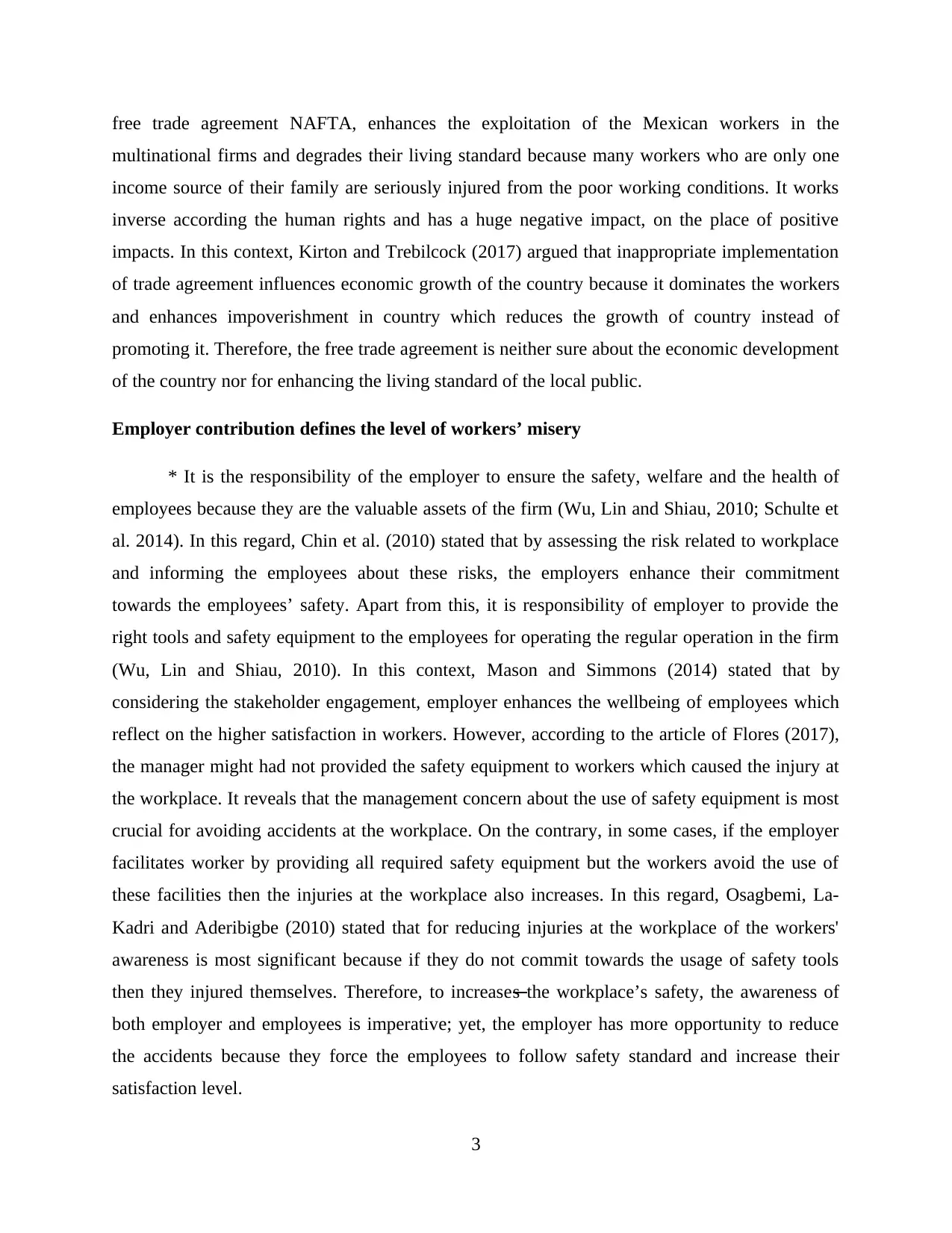
free trade agreement NAFTA, enhances the exploitation of the Mexican workers in the
multinational firms and degrades their living standard because many workers who are only one
income source of their family are seriously injured from the poor working conditions. It works
inverse according the human rights and has a huge negative impact, on the place of positive
impacts. In this context, Kirton and Trebilcock (2017) argued that inappropriate implementation
of trade agreement influences economic growth of the country because it dominates the workers
and enhances impoverishment in country which reduces the growth of country instead of
promoting it. Therefore, the free trade agreement is neither sure about the economic development
of the country nor for enhancing the living standard of the local public.
Employer contribution defines the level of workers’ misery
* It is the responsibility of the employer to ensure the safety, welfare and the health of
employees because they are the valuable assets of the firm (Wu, Lin and Shiau, 2010; Schulte et
al. 2014). In this regard, Chin et al. (2010) stated that by assessing the risk related to workplace
and informing the employees about these risks, the employers enhance their commitment
towards the employees’ safety. Apart from this, it is responsibility of employer to provide the
right tools and safety equipment to the employees for operating the regular operation in the firm
(Wu, Lin and Shiau, 2010). In this context, Mason and Simmons (2014) stated that by
considering the stakeholder engagement, employer enhances the wellbeing of employees which
reflect on the higher satisfaction in workers. However, according to the article of Flores (2017),
the manager might had not provided the safety equipment to workers which caused the injury at
the workplace. It reveals that the management concern about the use of safety equipment is most
crucial for avoiding accidents at the workplace. On the contrary, in some cases, if the employer
facilitates worker by providing all required safety equipment but the workers avoid the use of
these facilities then the injuries at the workplace also increases. In this regard, Osagbemi, La-
Kadri and Aderibigbe (2010) stated that for reducing injuries at the workplace of the workers'
awareness is most significant because if they do not commit towards the usage of safety tools
then they injured themselves. Therefore, to increases the workplace’s safety, the awareness of
both employer and employees is imperative; yet, the employer has more opportunity to reduce
the accidents because they force the employees to follow safety standard and increase their
satisfaction level.
3
multinational firms and degrades their living standard because many workers who are only one
income source of their family are seriously injured from the poor working conditions. It works
inverse according the human rights and has a huge negative impact, on the place of positive
impacts. In this context, Kirton and Trebilcock (2017) argued that inappropriate implementation
of trade agreement influences economic growth of the country because it dominates the workers
and enhances impoverishment in country which reduces the growth of country instead of
promoting it. Therefore, the free trade agreement is neither sure about the economic development
of the country nor for enhancing the living standard of the local public.
Employer contribution defines the level of workers’ misery
* It is the responsibility of the employer to ensure the safety, welfare and the health of
employees because they are the valuable assets of the firm (Wu, Lin and Shiau, 2010; Schulte et
al. 2014). In this regard, Chin et al. (2010) stated that by assessing the risk related to workplace
and informing the employees about these risks, the employers enhance their commitment
towards the employees’ safety. Apart from this, it is responsibility of employer to provide the
right tools and safety equipment to the employees for operating the regular operation in the firm
(Wu, Lin and Shiau, 2010). In this context, Mason and Simmons (2014) stated that by
considering the stakeholder engagement, employer enhances the wellbeing of employees which
reflect on the higher satisfaction in workers. However, according to the article of Flores (2017),
the manager might had not provided the safety equipment to workers which caused the injury at
the workplace. It reveals that the management concern about the use of safety equipment is most
crucial for avoiding accidents at the workplace. On the contrary, in some cases, if the employer
facilitates worker by providing all required safety equipment but the workers avoid the use of
these facilities then the injuries at the workplace also increases. In this regard, Osagbemi, La-
Kadri and Aderibigbe (2010) stated that for reducing injuries at the workplace of the workers'
awareness is most significant because if they do not commit towards the usage of safety tools
then they injured themselves. Therefore, to increases the workplace’s safety, the awareness of
both employer and employees is imperative; yet, the employer has more opportunity to reduce
the accidents because they force the employees to follow safety standard and increase their
satisfaction level.
3
Paraphrase This Document
Need a fresh take? Get an instant paraphrase of this document with our AI Paraphraser
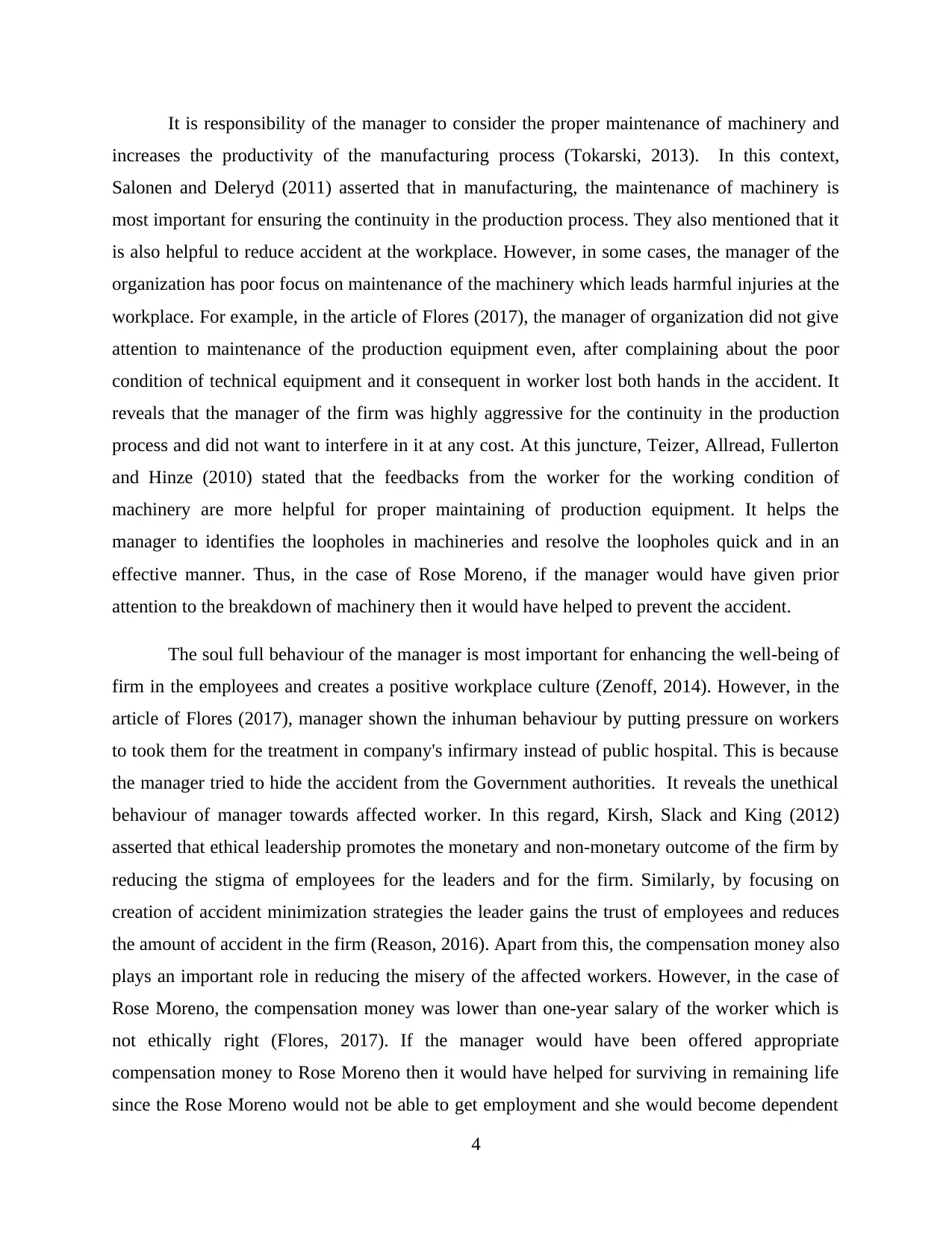
It is responsibility of the manager to consider the proper maintenance of machinery and
increases the productivity of the manufacturing process (Tokarski, 2013). In this context,
Salonen and Deleryd (2011) asserted that in manufacturing, the maintenance of machinery is
most important for ensuring the continuity in the production process. They also mentioned that it
is also helpful to reduce accident at the workplace. However, in some cases, the manager of the
organization has poor focus on maintenance of the machinery which leads harmful injuries at the
workplace. For example, in the article of Flores (2017), the manager of organization did not give
attention to maintenance of the production equipment even, after complaining about the poor
condition of technical equipment and it consequent in worker lost both hands in the accident. It
reveals that the manager of the firm was highly aggressive for the continuity in the production
process and did not want to interfere in it at any cost. At this juncture, Teizer, Allread, Fullerton
and Hinze (2010) stated that the feedbacks from the worker for the working condition of
machinery are more helpful for proper maintaining of production equipment. It helps the
manager to identifies the loopholes in machineries and resolve the loopholes quick and in an
effective manner. Thus, in the case of Rose Moreno, if the manager would have given prior
attention to the breakdown of machinery then it would have helped to prevent the accident.
The soul full behaviour of the manager is most important for enhancing the well-being of
firm in the employees and creates a positive workplace culture (Zenoff, 2014). However, in the
article of Flores (2017), manager shown the inhuman behaviour by putting pressure on workers
to took them for the treatment in company's infirmary instead of public hospital. This is because
the manager tried to hide the accident from the Government authorities. It reveals the unethical
behaviour of manager towards affected worker. In this regard, Kirsh, Slack and King (2012)
asserted that ethical leadership promotes the monetary and non-monetary outcome of the firm by
reducing the stigma of employees for the leaders and for the firm. Similarly, by focusing on
creation of accident minimization strategies the leader gains the trust of employees and reduces
the amount of accident in the firm (Reason, 2016). Apart from this, the compensation money also
plays an important role in reducing the misery of the affected workers. However, in the case of
Rose Moreno, the compensation money was lower than one-year salary of the worker which is
not ethically right (Flores, 2017). If the manager would have been offered appropriate
compensation money to Rose Moreno then it would have helped for surviving in remaining life
since the Rose Moreno would not be able to get employment and she would become dependent
4
increases the productivity of the manufacturing process (Tokarski, 2013). In this context,
Salonen and Deleryd (2011) asserted that in manufacturing, the maintenance of machinery is
most important for ensuring the continuity in the production process. They also mentioned that it
is also helpful to reduce accident at the workplace. However, in some cases, the manager of the
organization has poor focus on maintenance of the machinery which leads harmful injuries at the
workplace. For example, in the article of Flores (2017), the manager of organization did not give
attention to maintenance of the production equipment even, after complaining about the poor
condition of technical equipment and it consequent in worker lost both hands in the accident. It
reveals that the manager of the firm was highly aggressive for the continuity in the production
process and did not want to interfere in it at any cost. At this juncture, Teizer, Allread, Fullerton
and Hinze (2010) stated that the feedbacks from the worker for the working condition of
machinery are more helpful for proper maintaining of production equipment. It helps the
manager to identifies the loopholes in machineries and resolve the loopholes quick and in an
effective manner. Thus, in the case of Rose Moreno, if the manager would have given prior
attention to the breakdown of machinery then it would have helped to prevent the accident.
The soul full behaviour of the manager is most important for enhancing the well-being of
firm in the employees and creates a positive workplace culture (Zenoff, 2014). However, in the
article of Flores (2017), manager shown the inhuman behaviour by putting pressure on workers
to took them for the treatment in company's infirmary instead of public hospital. This is because
the manager tried to hide the accident from the Government authorities. It reveals the unethical
behaviour of manager towards affected worker. In this regard, Kirsh, Slack and King (2012)
asserted that ethical leadership promotes the monetary and non-monetary outcome of the firm by
reducing the stigma of employees for the leaders and for the firm. Similarly, by focusing on
creation of accident minimization strategies the leader gains the trust of employees and reduces
the amount of accident in the firm (Reason, 2016). Apart from this, the compensation money also
plays an important role in reducing the misery of the affected workers. However, in the case of
Rose Moreno, the compensation money was lower than one-year salary of the worker which is
not ethically right (Flores, 2017). If the manager would have been offered appropriate
compensation money to Rose Moreno then it would have helped for surviving in remaining life
since the Rose Moreno would not be able to get employment and she would become dependent
4
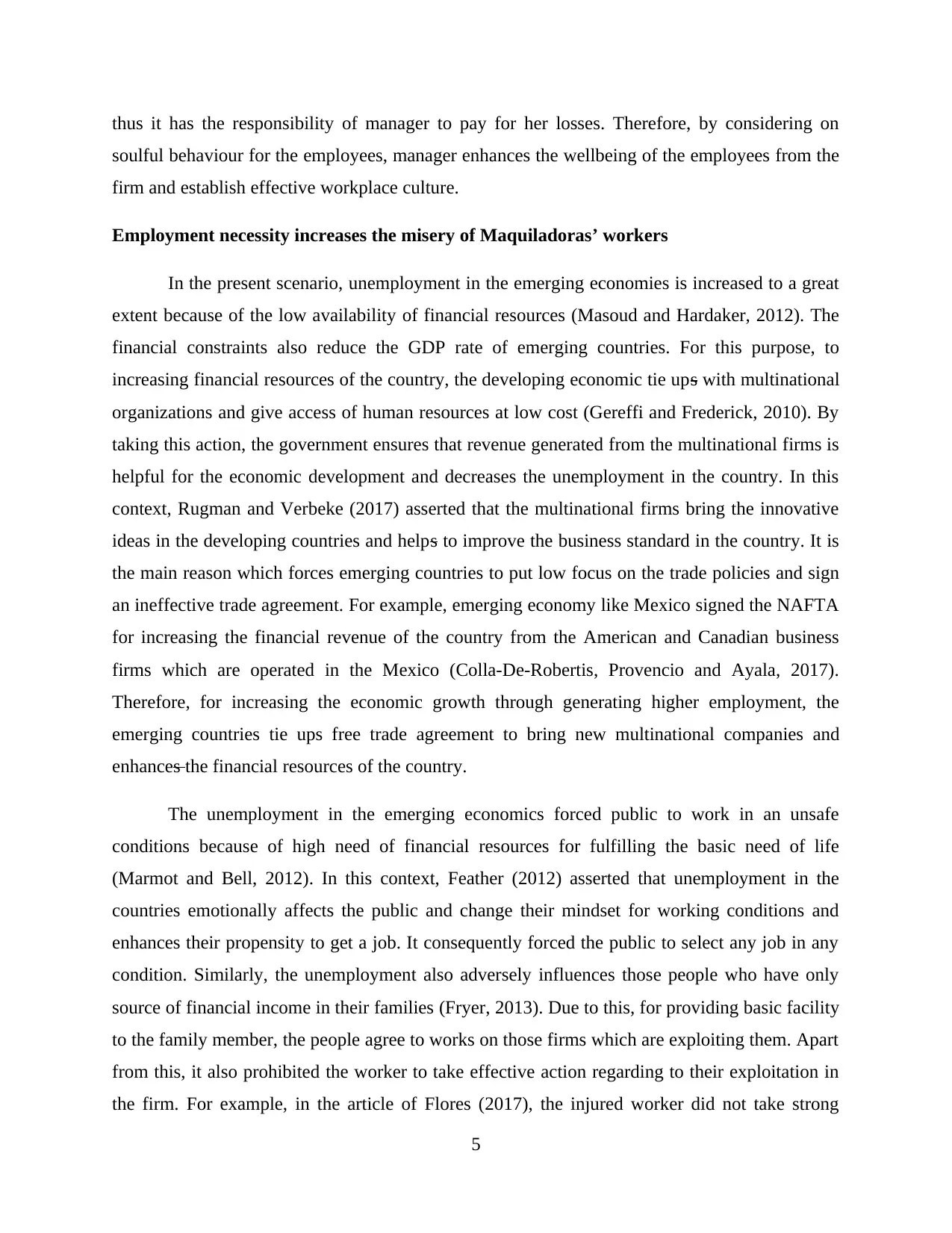
thus it has the responsibility of manager to pay for her losses. Therefore, by considering on
soulful behaviour for the employees, manager enhances the wellbeing of the employees from the
firm and establish effective workplace culture.
Employment necessity increases the misery of Maquiladoras’ workers
In the present scenario, unemployment in the emerging economies is increased to a great
extent because of the low availability of financial resources (Masoud and Hardaker, 2012). The
financial constraints also reduce the GDP rate of emerging countries. For this purpose, to
increasing financial resources of the country, the developing economic tie ups with multinational
organizations and give access of human resources at low cost (Gereffi and Frederick, 2010). By
taking this action, the government ensures that revenue generated from the multinational firms is
helpful for the economic development and decreases the unemployment in the country. In this
context, Rugman and Verbeke (2017) asserted that the multinational firms bring the innovative
ideas in the developing countries and helps to improve the business standard in the country. It is
the main reason which forces emerging countries to put low focus on the trade policies and sign
an ineffective trade agreement. For example, emerging economy like Mexico signed the NAFTA
for increasing the financial revenue of the country from the American and Canadian business
firms which are operated in the Mexico (Colla-De-Robertis, Provencio and Ayala, 2017).
Therefore, for increasing the economic growth through generating higher employment, the
emerging countries tie ups free trade agreement to bring new multinational companies and
enhances the financial resources of the country.
The unemployment in the emerging economics forced public to work in an unsafe
conditions because of high need of financial resources for fulfilling the basic need of life
(Marmot and Bell, 2012). In this context, Feather (2012) asserted that unemployment in the
countries emotionally affects the public and change their mindset for working conditions and
enhances their propensity to get a job. It consequently forced the public to select any job in any
condition. Similarly, the unemployment also adversely influences those people who have only
source of financial income in their families (Fryer, 2013). Due to this, for providing basic facility
to the family member, the people agree to works on those firms which are exploiting them. Apart
from this, it also prohibited the worker to take effective action regarding to their exploitation in
the firm. For example, in the article of Flores (2017), the injured worker did not take strong
5
soulful behaviour for the employees, manager enhances the wellbeing of the employees from the
firm and establish effective workplace culture.
Employment necessity increases the misery of Maquiladoras’ workers
In the present scenario, unemployment in the emerging economies is increased to a great
extent because of the low availability of financial resources (Masoud and Hardaker, 2012). The
financial constraints also reduce the GDP rate of emerging countries. For this purpose, to
increasing financial resources of the country, the developing economic tie ups with multinational
organizations and give access of human resources at low cost (Gereffi and Frederick, 2010). By
taking this action, the government ensures that revenue generated from the multinational firms is
helpful for the economic development and decreases the unemployment in the country. In this
context, Rugman and Verbeke (2017) asserted that the multinational firms bring the innovative
ideas in the developing countries and helps to improve the business standard in the country. It is
the main reason which forces emerging countries to put low focus on the trade policies and sign
an ineffective trade agreement. For example, emerging economy like Mexico signed the NAFTA
for increasing the financial revenue of the country from the American and Canadian business
firms which are operated in the Mexico (Colla-De-Robertis, Provencio and Ayala, 2017).
Therefore, for increasing the economic growth through generating higher employment, the
emerging countries tie ups free trade agreement to bring new multinational companies and
enhances the financial resources of the country.
The unemployment in the emerging economics forced public to work in an unsafe
conditions because of high need of financial resources for fulfilling the basic need of life
(Marmot and Bell, 2012). In this context, Feather (2012) asserted that unemployment in the
countries emotionally affects the public and change their mindset for working conditions and
enhances their propensity to get a job. It consequently forced the public to select any job in any
condition. Similarly, the unemployment also adversely influences those people who have only
source of financial income in their families (Fryer, 2013). Due to this, for providing basic facility
to the family member, the people agree to works on those firms which are exploiting them. Apart
from this, it also prohibited the worker to take effective action regarding to their exploitation in
the firm. For example, in the article of Flores (2017), the injured worker did not take strong
5
⊘ This is a preview!⊘
Do you want full access?
Subscribe today to unlock all pages.

Trusted by 1+ million students worldwide
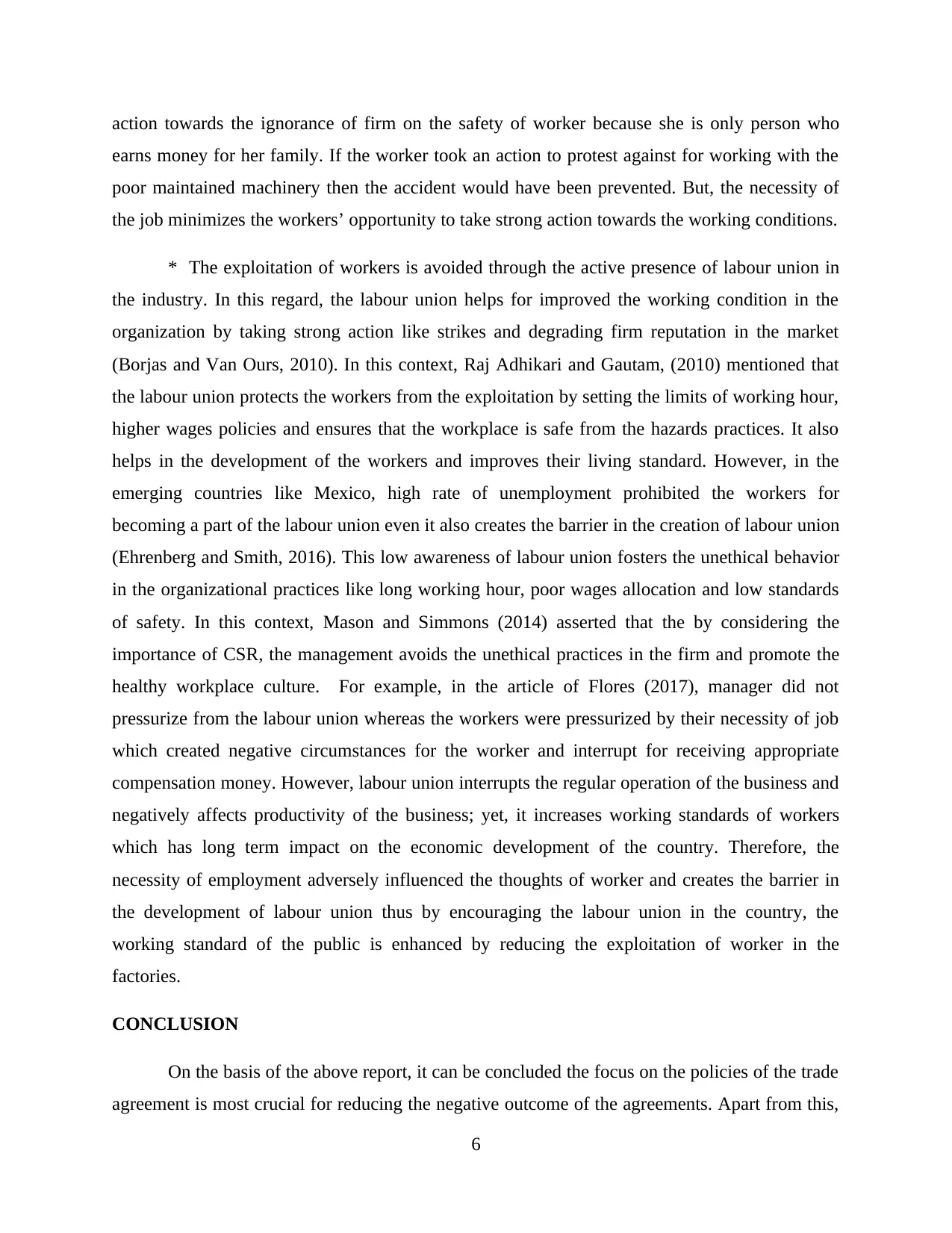
action towards the ignorance of firm on the safety of worker because she is only person who
earns money for her family. If the worker took an action to protest against for working with the
poor maintained machinery then the accident would have been prevented. But, the necessity of
the job minimizes the workers’ opportunity to take strong action towards the working conditions.
* The exploitation of workers is avoided through the active presence of labour union in
the industry. In this regard, the labour union helps for improved the working condition in the
organization by taking strong action like strikes and degrading firm reputation in the market
(Borjas and Van Ours, 2010). In this context, Raj Adhikari and Gautam, (2010) mentioned that
the labour union protects the workers from the exploitation by setting the limits of working hour,
higher wages policies and ensures that the workplace is safe from the hazards practices. It also
helps in the development of the workers and improves their living standard. However, in the
emerging countries like Mexico, high rate of unemployment prohibited the workers for
becoming a part of the labour union even it also creates the barrier in the creation of labour union
(Ehrenberg and Smith, 2016). This low awareness of labour union fosters the unethical behavior
in the organizational practices like long working hour, poor wages allocation and low standards
of safety. In this context, Mason and Simmons (2014) asserted that the by considering the
importance of CSR, the management avoids the unethical practices in the firm and promote the
healthy workplace culture. For example, in the article of Flores (2017), manager did not
pressurize from the labour union whereas the workers were pressurized by their necessity of job
which created negative circumstances for the worker and interrupt for receiving appropriate
compensation money. However, labour union interrupts the regular operation of the business and
negatively affects productivity of the business; yet, it increases working standards of workers
which has long term impact on the economic development of the country. Therefore, the
necessity of employment adversely influenced the thoughts of worker and creates the barrier in
the development of labour union thus by encouraging the labour union in the country, the
working standard of the public is enhanced by reducing the exploitation of worker in the
factories.
CONCLUSION
On the basis of the above report, it can be concluded the focus on the policies of the trade
agreement is most crucial for reducing the negative outcome of the agreements. Apart from this,
6
earns money for her family. If the worker took an action to protest against for working with the
poor maintained machinery then the accident would have been prevented. But, the necessity of
the job minimizes the workers’ opportunity to take strong action towards the working conditions.
* The exploitation of workers is avoided through the active presence of labour union in
the industry. In this regard, the labour union helps for improved the working condition in the
organization by taking strong action like strikes and degrading firm reputation in the market
(Borjas and Van Ours, 2010). In this context, Raj Adhikari and Gautam, (2010) mentioned that
the labour union protects the workers from the exploitation by setting the limits of working hour,
higher wages policies and ensures that the workplace is safe from the hazards practices. It also
helps in the development of the workers and improves their living standard. However, in the
emerging countries like Mexico, high rate of unemployment prohibited the workers for
becoming a part of the labour union even it also creates the barrier in the creation of labour union
(Ehrenberg and Smith, 2016). This low awareness of labour union fosters the unethical behavior
in the organizational practices like long working hour, poor wages allocation and low standards
of safety. In this context, Mason and Simmons (2014) asserted that the by considering the
importance of CSR, the management avoids the unethical practices in the firm and promote the
healthy workplace culture. For example, in the article of Flores (2017), manager did not
pressurize from the labour union whereas the workers were pressurized by their necessity of job
which created negative circumstances for the worker and interrupt for receiving appropriate
compensation money. However, labour union interrupts the regular operation of the business and
negatively affects productivity of the business; yet, it increases working standards of workers
which has long term impact on the economic development of the country. Therefore, the
necessity of employment adversely influenced the thoughts of worker and creates the barrier in
the development of labour union thus by encouraging the labour union in the country, the
working standard of the public is enhanced by reducing the exploitation of worker in the
factories.
CONCLUSION
On the basis of the above report, it can be concluded the focus on the policies of the trade
agreement is most crucial for reducing the negative outcome of the agreements. Apart from this,
6
Paraphrase This Document
Need a fresh take? Get an instant paraphrase of this document with our AI Paraphraser
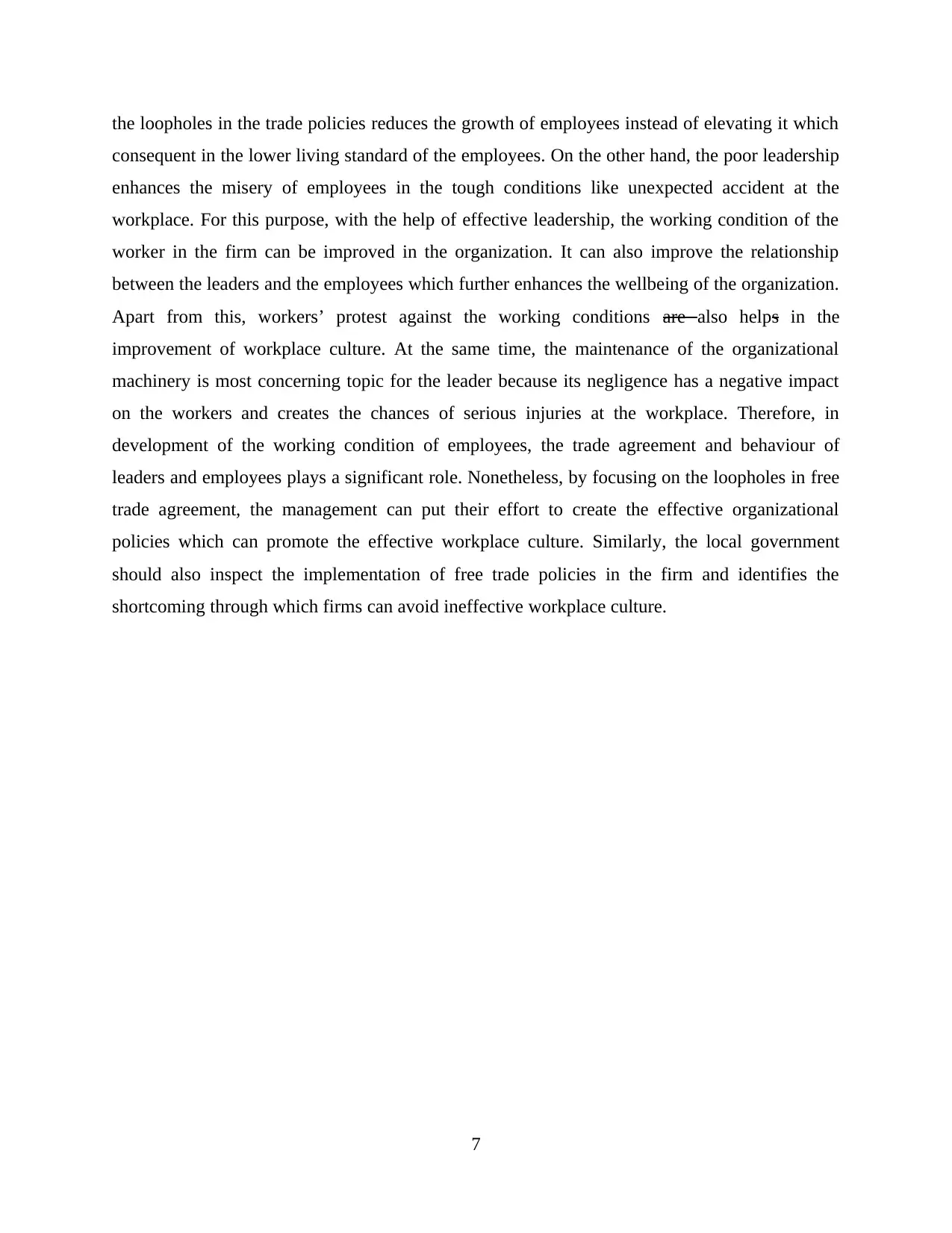
the loopholes in the trade policies reduces the growth of employees instead of elevating it which
consequent in the lower living standard of the employees. On the other hand, the poor leadership
enhances the misery of employees in the tough conditions like unexpected accident at the
workplace. For this purpose, with the help of effective leadership, the working condition of the
worker in the firm can be improved in the organization. It can also improve the relationship
between the leaders and the employees which further enhances the wellbeing of the organization.
Apart from this, workers’ protest against the working conditions are also helps in the
improvement of workplace culture. At the same time, the maintenance of the organizational
machinery is most concerning topic for the leader because its negligence has a negative impact
on the workers and creates the chances of serious injuries at the workplace. Therefore, in
development of the working condition of employees, the trade agreement and behaviour of
leaders and employees plays a significant role. Nonetheless, by focusing on the loopholes in free
trade agreement, the management can put their effort to create the effective organizational
policies which can promote the effective workplace culture. Similarly, the local government
should also inspect the implementation of free trade policies in the firm and identifies the
shortcoming through which firms can avoid ineffective workplace culture.
7
consequent in the lower living standard of the employees. On the other hand, the poor leadership
enhances the misery of employees in the tough conditions like unexpected accident at the
workplace. For this purpose, with the help of effective leadership, the working condition of the
worker in the firm can be improved in the organization. It can also improve the relationship
between the leaders and the employees which further enhances the wellbeing of the organization.
Apart from this, workers’ protest against the working conditions are also helps in the
improvement of workplace culture. At the same time, the maintenance of the organizational
machinery is most concerning topic for the leader because its negligence has a negative impact
on the workers and creates the chances of serious injuries at the workplace. Therefore, in
development of the working condition of employees, the trade agreement and behaviour of
leaders and employees plays a significant role. Nonetheless, by focusing on the loopholes in free
trade agreement, the management can put their effort to create the effective organizational
policies which can promote the effective workplace culture. Similarly, the local government
should also inspect the implementation of free trade policies in the firm and identifies the
shortcoming through which firms can avoid ineffective workplace culture.
7
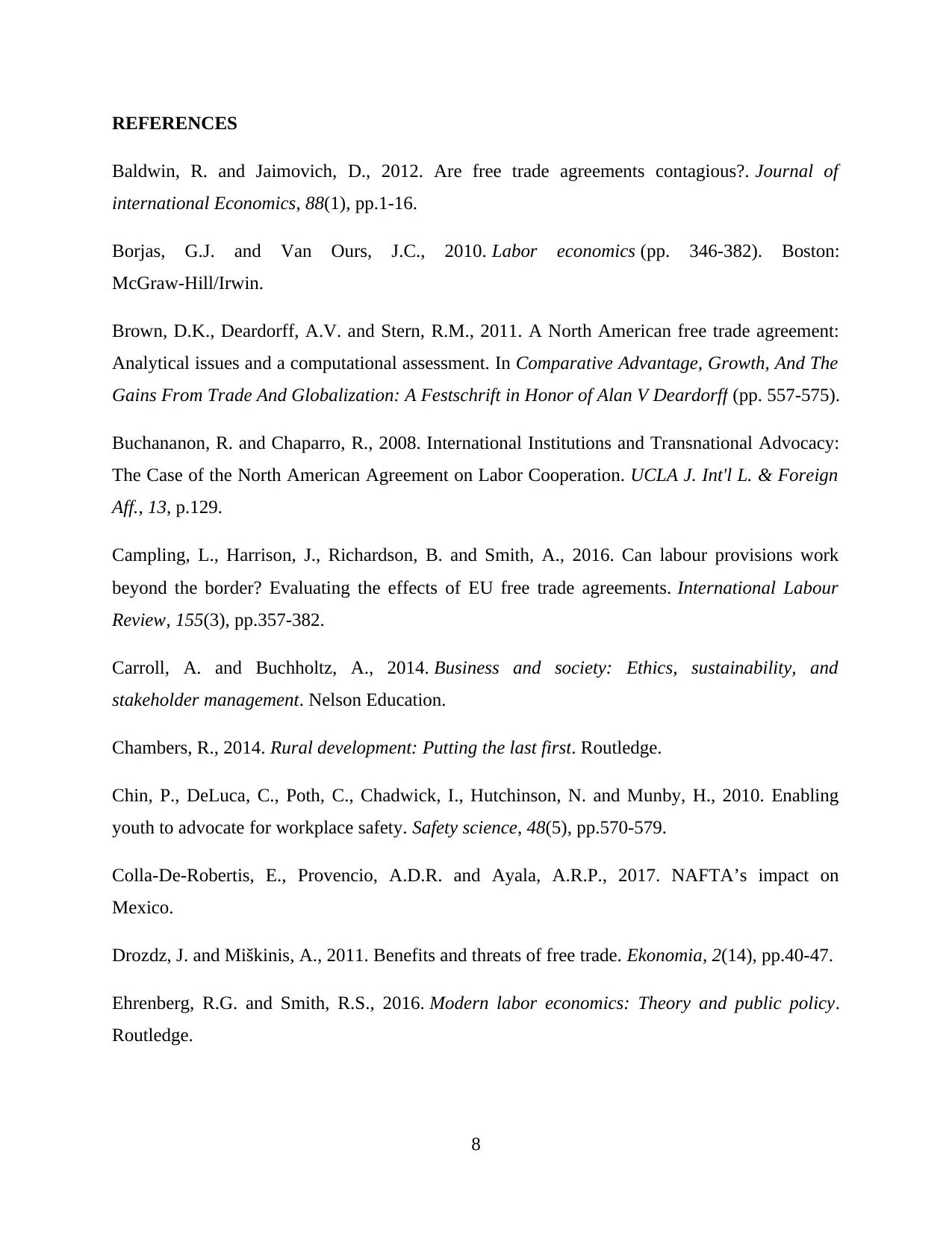
REFERENCES
Baldwin, R. and Jaimovich, D., 2012. Are free trade agreements contagious?. Journal of
international Economics, 88(1), pp.1-16.
Borjas, G.J. and Van Ours, J.C., 2010. Labor economics (pp. 346-382). Boston:
McGraw-Hill/Irwin.
Brown, D.K., Deardorff, A.V. and Stern, R.M., 2011. A North American free trade agreement:
Analytical issues and a computational assessment. In Comparative Advantage, Growth, And The
Gains From Trade And Globalization: A Festschrift in Honor of Alan V Deardorff (pp. 557-575).
Buchananon, R. and Chaparro, R., 2008. International Institutions and Transnational Advocacy:
The Case of the North American Agreement on Labor Cooperation. UCLA J. Int'l L. & Foreign
Aff., 13, p.129.
Campling, L., Harrison, J., Richardson, B. and Smith, A., 2016. Can labour provisions work
beyond the border? Evaluating the effects of EU free trade agreements. International Labour
Review, 155(3), pp.357-382.
Carroll, A. and Buchholtz, A., 2014. Business and society: Ethics, sustainability, and
stakeholder management. Nelson Education.
Chambers, R., 2014. Rural development: Putting the last first. Routledge.
Chin, P., DeLuca, C., Poth, C., Chadwick, I., Hutchinson, N. and Munby, H., 2010. Enabling
youth to advocate for workplace safety. Safety science, 48(5), pp.570-579.
Colla-De-Robertis, E., Provencio, A.D.R. and Ayala, A.R.P., 2017. NAFTA’s impact on
Mexico.
Drozdz, J. and Miškinis, A., 2011. Benefits and threats of free trade. Ekonomia, 2(14), pp.40-47.
Ehrenberg, R.G. and Smith, R.S., 2016. Modern labor economics: Theory and public policy.
Routledge.
8
Baldwin, R. and Jaimovich, D., 2012. Are free trade agreements contagious?. Journal of
international Economics, 88(1), pp.1-16.
Borjas, G.J. and Van Ours, J.C., 2010. Labor economics (pp. 346-382). Boston:
McGraw-Hill/Irwin.
Brown, D.K., Deardorff, A.V. and Stern, R.M., 2011. A North American free trade agreement:
Analytical issues and a computational assessment. In Comparative Advantage, Growth, And The
Gains From Trade And Globalization: A Festschrift in Honor of Alan V Deardorff (pp. 557-575).
Buchananon, R. and Chaparro, R., 2008. International Institutions and Transnational Advocacy:
The Case of the North American Agreement on Labor Cooperation. UCLA J. Int'l L. & Foreign
Aff., 13, p.129.
Campling, L., Harrison, J., Richardson, B. and Smith, A., 2016. Can labour provisions work
beyond the border? Evaluating the effects of EU free trade agreements. International Labour
Review, 155(3), pp.357-382.
Carroll, A. and Buchholtz, A., 2014. Business and society: Ethics, sustainability, and
stakeholder management. Nelson Education.
Chambers, R., 2014. Rural development: Putting the last first. Routledge.
Chin, P., DeLuca, C., Poth, C., Chadwick, I., Hutchinson, N. and Munby, H., 2010. Enabling
youth to advocate for workplace safety. Safety science, 48(5), pp.570-579.
Colla-De-Robertis, E., Provencio, A.D.R. and Ayala, A.R.P., 2017. NAFTA’s impact on
Mexico.
Drozdz, J. and Miškinis, A., 2011. Benefits and threats of free trade. Ekonomia, 2(14), pp.40-47.
Ehrenberg, R.G. and Smith, R.S., 2016. Modern labor economics: Theory and public policy.
Routledge.
8
⊘ This is a preview!⊘
Do you want full access?
Subscribe today to unlock all pages.

Trusted by 1+ million students worldwide
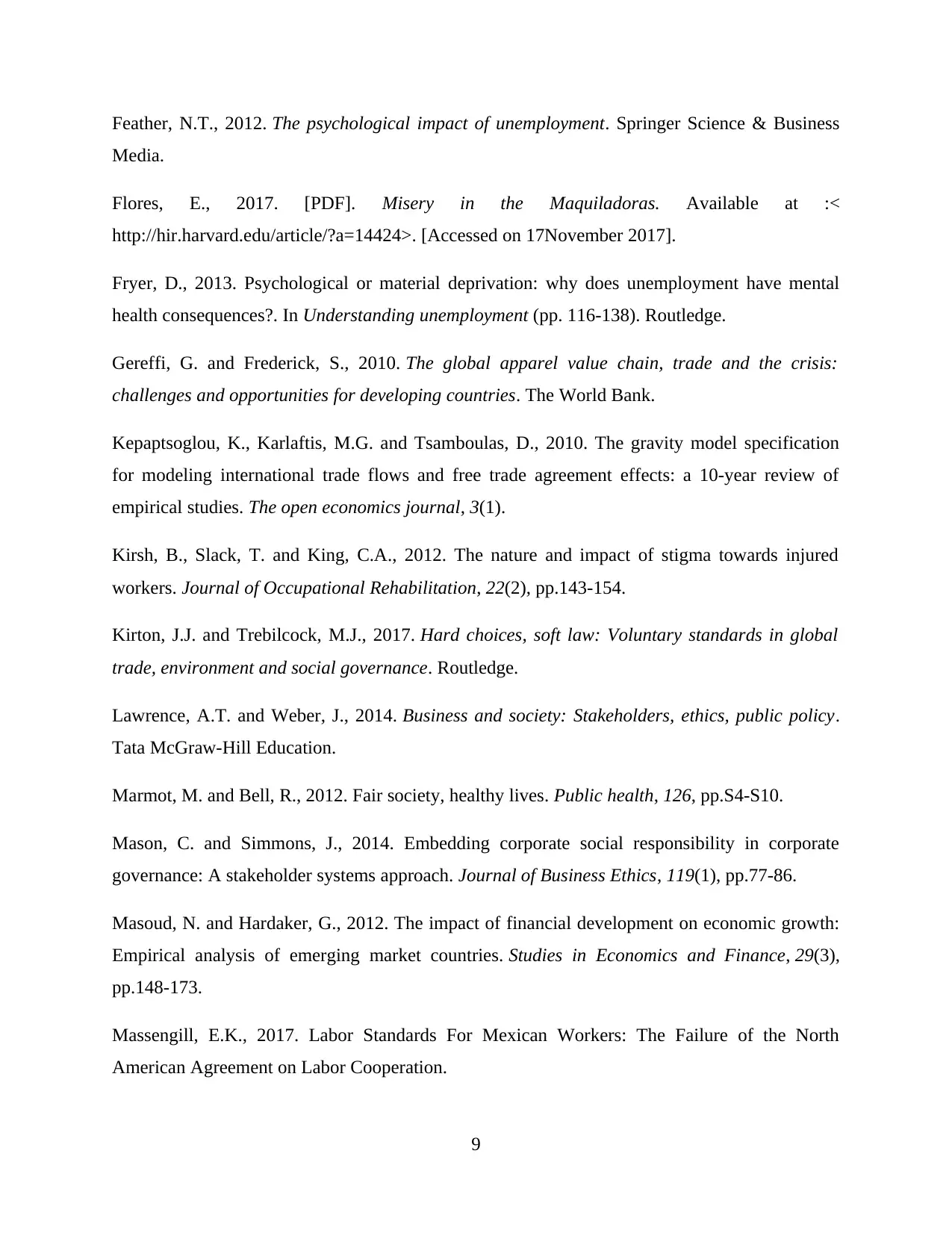
Feather, N.T., 2012. The psychological impact of unemployment. Springer Science & Business
Media.
Flores, E., 2017. [PDF]. Misery in the Maquiladoras. Available at :<
http://hir.harvard.edu/article/?a=14424>. [Accessed on 17November 2017].
Fryer, D., 2013. Psychological or material deprivation: why does unemployment have mental
health consequences?. In Understanding unemployment (pp. 116-138). Routledge.
Gereffi, G. and Frederick, S., 2010. The global apparel value chain, trade and the crisis:
challenges and opportunities for developing countries. The World Bank.
Kepaptsoglou, K., Karlaftis, M.G. and Tsamboulas, D., 2010. The gravity model specification
for modeling international trade flows and free trade agreement effects: a 10-year review of
empirical studies. The open economics journal, 3(1).
Kirsh, B., Slack, T. and King, C.A., 2012. The nature and impact of stigma towards injured
workers. Journal of Occupational Rehabilitation, 22(2), pp.143-154.
Kirton, J.J. and Trebilcock, M.J., 2017. Hard choices, soft law: Voluntary standards in global
trade, environment and social governance. Routledge.
Lawrence, A.T. and Weber, J., 2014. Business and society: Stakeholders, ethics, public policy.
Tata McGraw-Hill Education.
Marmot, M. and Bell, R., 2012. Fair society, healthy lives. Public health, 126, pp.S4-S10.
Mason, C. and Simmons, J., 2014. Embedding corporate social responsibility in corporate
governance: A stakeholder systems approach. Journal of Business Ethics, 119(1), pp.77-86.
Masoud, N. and Hardaker, G., 2012. The impact of financial development on economic growth:
Empirical analysis of emerging market countries. Studies in Economics and Finance, 29(3),
pp.148-173.
Massengill, E.K., 2017. Labor Standards For Mexican Workers: The Failure of the North
American Agreement on Labor Cooperation.
9
Media.
Flores, E., 2017. [PDF]. Misery in the Maquiladoras. Available at :<
http://hir.harvard.edu/article/?a=14424>. [Accessed on 17November 2017].
Fryer, D., 2013. Psychological or material deprivation: why does unemployment have mental
health consequences?. In Understanding unemployment (pp. 116-138). Routledge.
Gereffi, G. and Frederick, S., 2010. The global apparel value chain, trade and the crisis:
challenges and opportunities for developing countries. The World Bank.
Kepaptsoglou, K., Karlaftis, M.G. and Tsamboulas, D., 2010. The gravity model specification
for modeling international trade flows and free trade agreement effects: a 10-year review of
empirical studies. The open economics journal, 3(1).
Kirsh, B., Slack, T. and King, C.A., 2012. The nature and impact of stigma towards injured
workers. Journal of Occupational Rehabilitation, 22(2), pp.143-154.
Kirton, J.J. and Trebilcock, M.J., 2017. Hard choices, soft law: Voluntary standards in global
trade, environment and social governance. Routledge.
Lawrence, A.T. and Weber, J., 2014. Business and society: Stakeholders, ethics, public policy.
Tata McGraw-Hill Education.
Marmot, M. and Bell, R., 2012. Fair society, healthy lives. Public health, 126, pp.S4-S10.
Mason, C. and Simmons, J., 2014. Embedding corporate social responsibility in corporate
governance: A stakeholder systems approach. Journal of Business Ethics, 119(1), pp.77-86.
Masoud, N. and Hardaker, G., 2012. The impact of financial development on economic growth:
Empirical analysis of emerging market countries. Studies in Economics and Finance, 29(3),
pp.148-173.
Massengill, E.K., 2017. Labor Standards For Mexican Workers: The Failure of the North
American Agreement on Labor Cooperation.
9
Paraphrase This Document
Need a fresh take? Get an instant paraphrase of this document with our AI Paraphraser
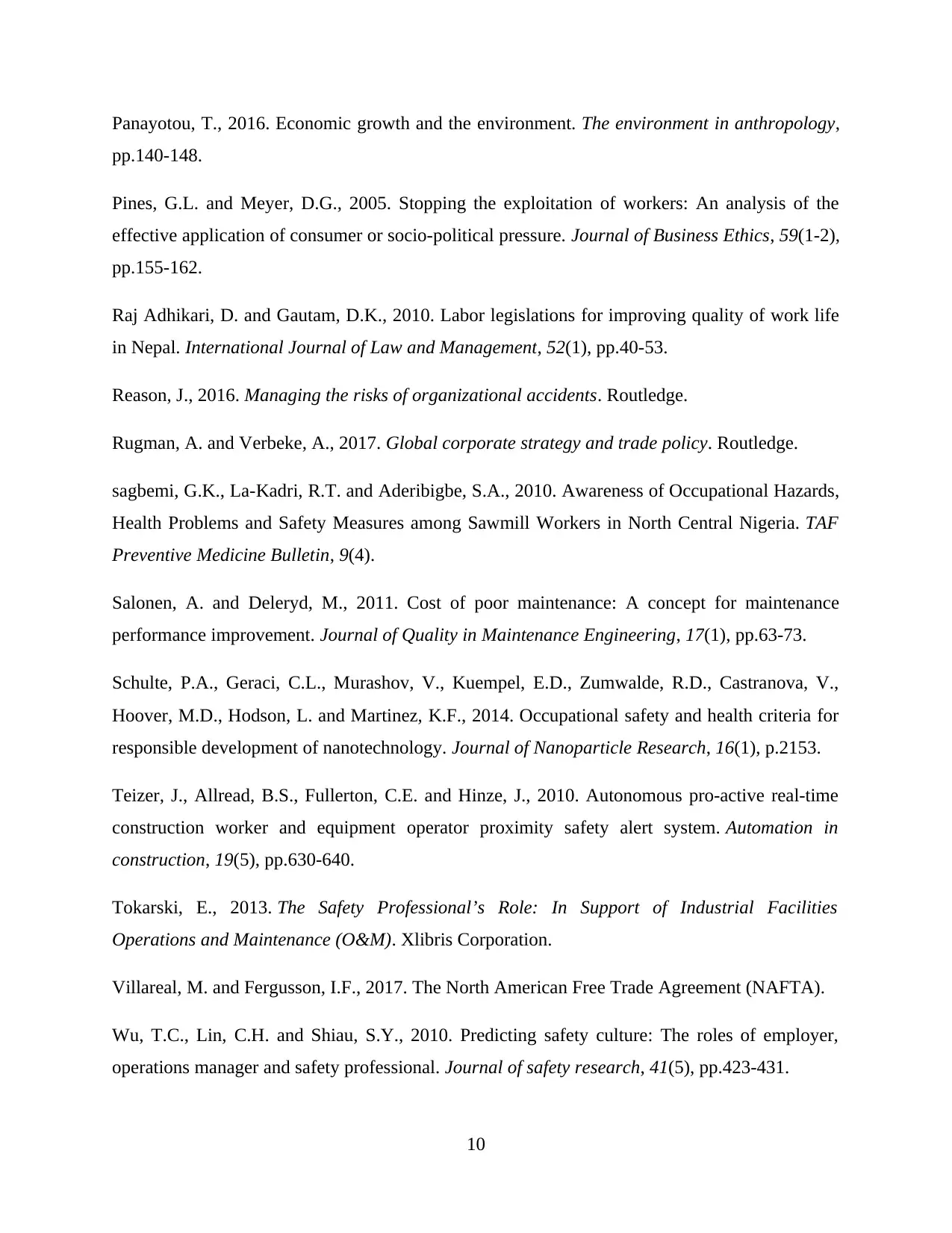
Panayotou, T., 2016. Economic growth and the environment. The environment in anthropology,
pp.140-148.
Pines, G.L. and Meyer, D.G., 2005. Stopping the exploitation of workers: An analysis of the
effective application of consumer or socio-political pressure. Journal of Business Ethics, 59(1-2),
pp.155-162.
Raj Adhikari, D. and Gautam, D.K., 2010. Labor legislations for improving quality of work life
in Nepal. International Journal of Law and Management, 52(1), pp.40-53.
Reason, J., 2016. Managing the risks of organizational accidents. Routledge.
Rugman, A. and Verbeke, A., 2017. Global corporate strategy and trade policy. Routledge.
sagbemi, G.K., La-Kadri, R.T. and Aderibigbe, S.A., 2010. Awareness of Occupational Hazards,
Health Problems and Safety Measures among Sawmill Workers in North Central Nigeria. TAF
Preventive Medicine Bulletin, 9(4).
Salonen, A. and Deleryd, M., 2011. Cost of poor maintenance: A concept for maintenance
performance improvement. Journal of Quality in Maintenance Engineering, 17(1), pp.63-73.
Schulte, P.A., Geraci, C.L., Murashov, V., Kuempel, E.D., Zumwalde, R.D., Castranova, V.,
Hoover, M.D., Hodson, L. and Martinez, K.F., 2014. Occupational safety and health criteria for
responsible development of nanotechnology. Journal of Nanoparticle Research, 16(1), p.2153.
Teizer, J., Allread, B.S., Fullerton, C.E. and Hinze, J., 2010. Autonomous pro-active real-time
construction worker and equipment operator proximity safety alert system. Automation in
construction, 19(5), pp.630-640.
Tokarski, E., 2013. The Safety Professional’s Role: In Support of Industrial Facilities
Operations and Maintenance (O&M). Xlibris Corporation.
Villareal, M. and Fergusson, I.F., 2017. The North American Free Trade Agreement (NAFTA).
Wu, T.C., Lin, C.H. and Shiau, S.Y., 2010. Predicting safety culture: The roles of employer,
operations manager and safety professional. Journal of safety research, 41(5), pp.423-431.
10
pp.140-148.
Pines, G.L. and Meyer, D.G., 2005. Stopping the exploitation of workers: An analysis of the
effective application of consumer or socio-political pressure. Journal of Business Ethics, 59(1-2),
pp.155-162.
Raj Adhikari, D. and Gautam, D.K., 2010. Labor legislations for improving quality of work life
in Nepal. International Journal of Law and Management, 52(1), pp.40-53.
Reason, J., 2016. Managing the risks of organizational accidents. Routledge.
Rugman, A. and Verbeke, A., 2017. Global corporate strategy and trade policy. Routledge.
sagbemi, G.K., La-Kadri, R.T. and Aderibigbe, S.A., 2010. Awareness of Occupational Hazards,
Health Problems and Safety Measures among Sawmill Workers in North Central Nigeria. TAF
Preventive Medicine Bulletin, 9(4).
Salonen, A. and Deleryd, M., 2011. Cost of poor maintenance: A concept for maintenance
performance improvement. Journal of Quality in Maintenance Engineering, 17(1), pp.63-73.
Schulte, P.A., Geraci, C.L., Murashov, V., Kuempel, E.D., Zumwalde, R.D., Castranova, V.,
Hoover, M.D., Hodson, L. and Martinez, K.F., 2014. Occupational safety and health criteria for
responsible development of nanotechnology. Journal of Nanoparticle Research, 16(1), p.2153.
Teizer, J., Allread, B.S., Fullerton, C.E. and Hinze, J., 2010. Autonomous pro-active real-time
construction worker and equipment operator proximity safety alert system. Automation in
construction, 19(5), pp.630-640.
Tokarski, E., 2013. The Safety Professional’s Role: In Support of Industrial Facilities
Operations and Maintenance (O&M). Xlibris Corporation.
Villareal, M. and Fergusson, I.F., 2017. The North American Free Trade Agreement (NAFTA).
Wu, T.C., Lin, C.H. and Shiau, S.Y., 2010. Predicting safety culture: The roles of employer,
operations manager and safety professional. Journal of safety research, 41(5), pp.423-431.
10
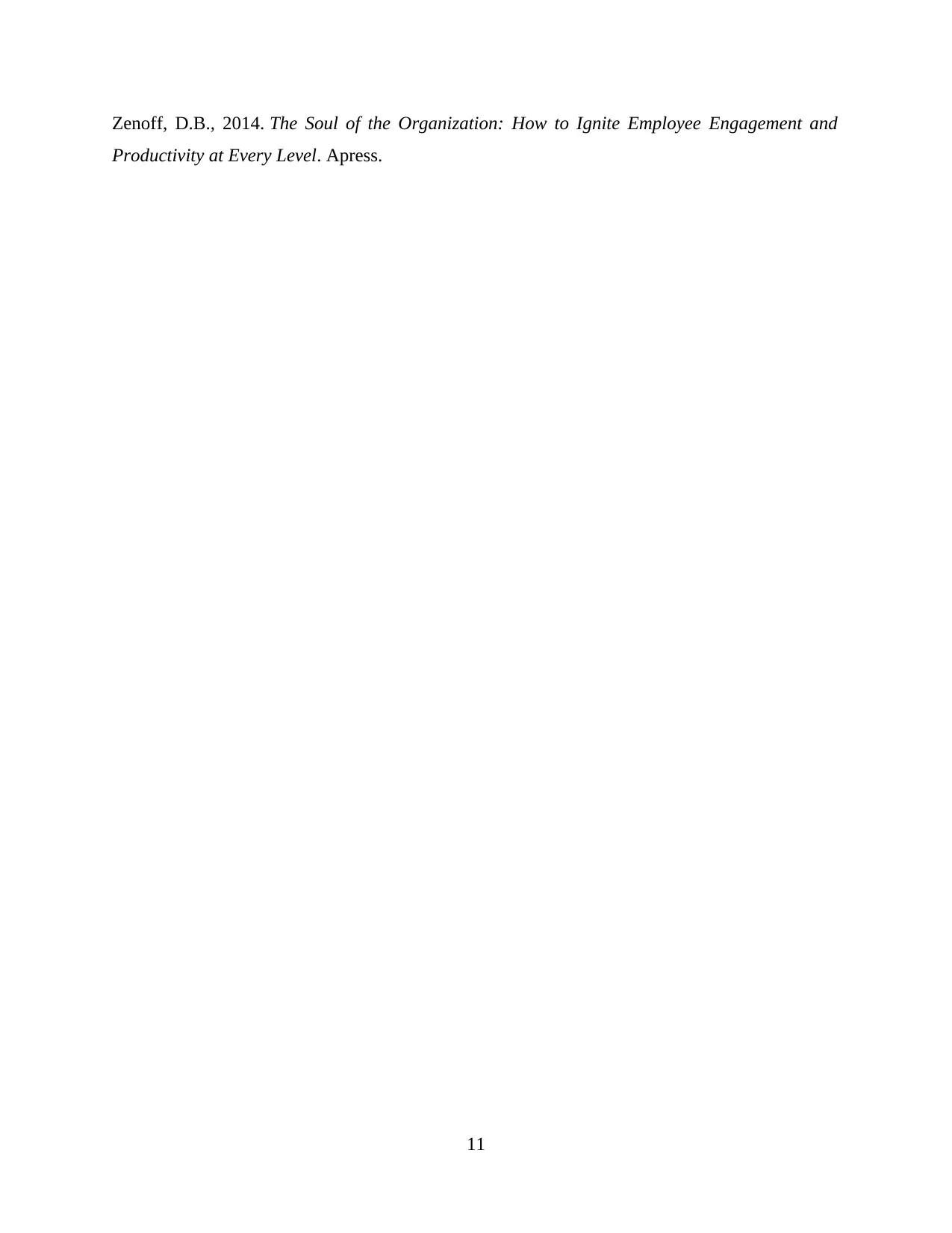
Zenoff, D.B., 2014. The Soul of the Organization: How to Ignite Employee Engagement and
Productivity at Every Level. Apress.
11
Productivity at Every Level. Apress.
11
⊘ This is a preview!⊘
Do you want full access?
Subscribe today to unlock all pages.

Trusted by 1+ million students worldwide
1 out of 12
Related Documents
Your All-in-One AI-Powered Toolkit for Academic Success.
+13062052269
info@desklib.com
Available 24*7 on WhatsApp / Email
![[object Object]](/_next/static/media/star-bottom.7253800d.svg)
Unlock your academic potential
Copyright © 2020–2026 A2Z Services. All Rights Reserved. Developed and managed by ZUCOL.





